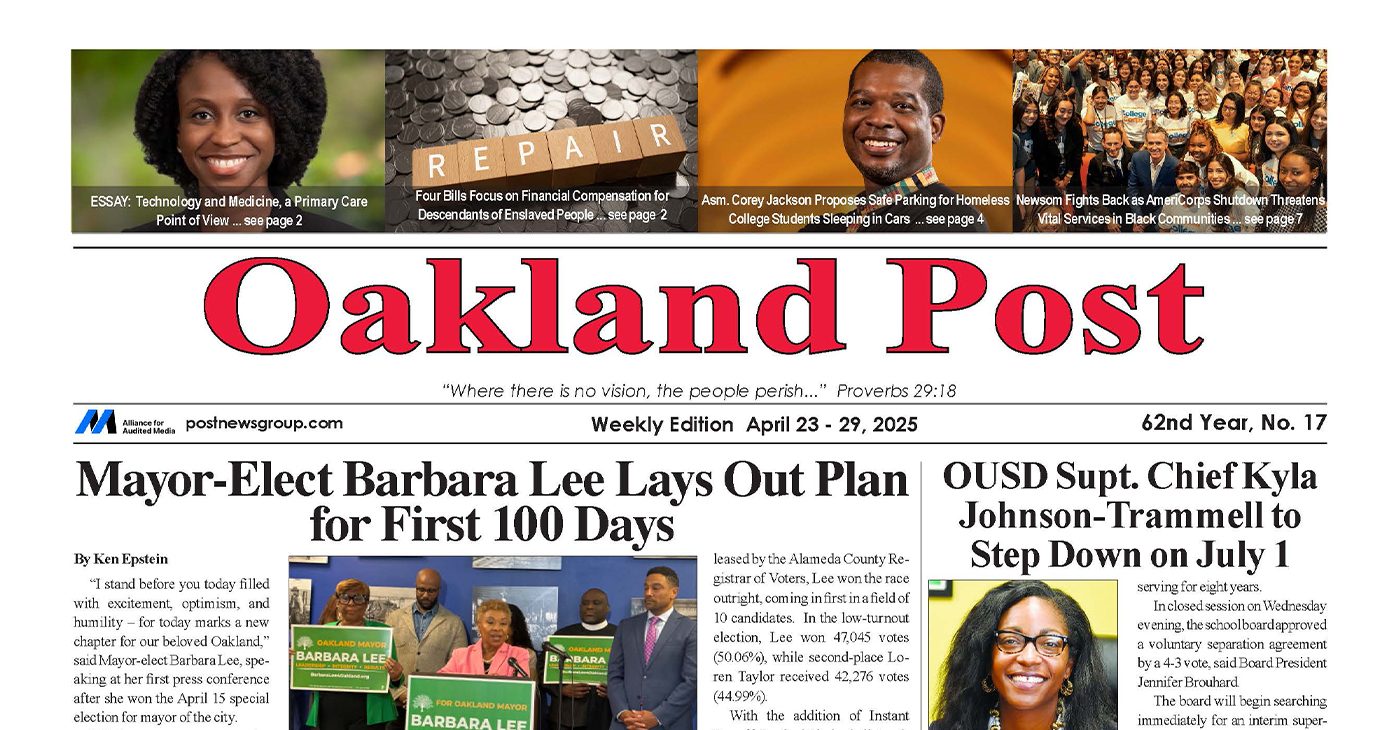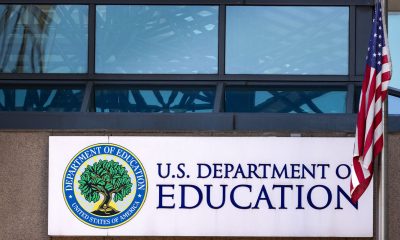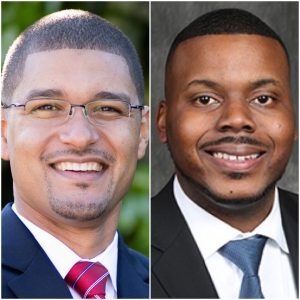Community
Ward 8 Residents Demand Greater Police Presence, Respect
WASHINGTON INFORMER — As Ward 8 residents continue to fall victim to violent crime, questions about the nature of police-community relations — particularly the police’s level of involvement in curbing illegal activity — continue to weigh heavy on the minds of community leaders.
Sam P. K. Collins
As Ward 8 residents continue to fall victim to violent crime, questions about the nature of police-community relations — particularly the police’s level of involvement in curbing illegal activity — continue to weigh heavy on the minds of community leaders.
While no quick fix exists for Robbie Woodland, a Congress Heights resident and advisory neighborhood commissioner, expressed a desire for officers who quickly and effectively respond to residents’ calls and proactively crack down on illegal activity known to occur in front of business establishments and other public areas.
“You have a group of us who don’t want policing. At the same time, you don’t want the shooting. I don’t know if there’s a healthy medium,” Woodland told The Washington Informer.
Woodland, commissioner of Single Member District 8C03, which includes parts of Martin Luther King Jr. Avenue, Wheeler Road, and Trenton Place, mentioned a private meeting, that took place on the evening of July 18 in the community room of the Metropolitan Police Department’s 7th District Police Station on Alabama Avenue.
Participants included three parents, 7th District Commander Andre Wright, D.C. Attorney General Karl Racine, members of the Gang Task Force and Department of Youth and Rehabilitative Services — all of whom Woodland said she contacted to address the recent spates of mob attacks allegedly orchestrated by youth attending local public and public charter schools.
Woodland, sworn into office at the beginning of the year, recounted seeing transit officials stand after a large group, referred to as the Swag Boys and Swag Girls, jumped a woman and her three children at Anacostia Metro Station in April. She said police officers didn’t arrive until she called for assistance.
Weeks after that incident, Woodland endeavored to identify teens filmed in other assaults of their peers on the street and visits to their apartments.
She said those videos along with a growing list of complaints from constituents, compelled her to pressure 7thDistrict and other partners for solutions that showed that they prioritized residents’ safety. She made clear that she couldn’t accept crime reduction alternatives, particularly those that placed that responsibility in the hands of people with no law enforcement experience.
“I think policing is needed to a degree. I’m not saying for them to harass people, but we as a community can’t do the policing ourselves,” Woodland said. “The violence interrupters don’t interrupt violence. They’re only in a small area of Southeast, and they have to get approval before they get into another area. They’re not licensed carriers so they’ll be running with the rest of us when there’s shooting.”
Addressing an Ongoing Problem
As of July 23, MPD reported 94 homicides citywide, including that of 11-year-old Karon Brown, allegedly murdered on July 18 by an adult male in the aftermath of a fight between adults and youngsters. Other violent crimes of prominence in the District include assault with a deadly weapon and robbery, though instances of the former decreased by four percent over the last year.

11-year old Karon Brown was fatally shot by an adult male in the aftermath of a fight. (Courtesy photo/NBC4)
To proactively tackle crime, the Bowser administration has relied on MPD officers and violence interrupters, people with community rapport who help settle disputes.
In her Fiscal Year 2020 budget, D.C. Mayor Muriel Bowser (D) allocated $2.5 million to the Office of Neighborhood Engagement and Safety for the expansion of the program, currently in its second year of operation. That infusion of funds provided seven additional full-time violence interrupters, case managers, and community activities in places with the greatest need.
At its inception, ONSE’s full-time and part-time violence interrupters lived and maintained a presence in 20 District neighborhoods.
The violence interrupters and Pathways Program, through which 50 of what’s considered the District’s most likely violent offenders gain resources for self-sustainability, came out of the Neighborhood Engagement Achieves Results Act, legislation passed in 2016 to explore community-based solutions to the underlying causes of violent crime.
In a victory for Black Lives Matter DC activists, a District Court judge ruled last month that MPD must record detailed stop-and-frisk data, including the race of the person stopped, the reason for the stop, and whether the stop resulted in the discovery of criminal activity.
This happened weeks after the off-duty MPD officer who allegedly killed D’Quan Young last year, escaped both federal and District charges in the 24-year-old’s death.
Last Saturday, after Ward 8 Councilmember Trayon White (D) gave his annual address at Martha’s Table at the Commons in Southeast, Black Lives Matter DC Core Organizer April Goggans led a community dialogue intended to explore alternatives to what had been described as over-policing.
White said that officers need to respect Ward 8 residents more and show more initiative in quelling violent crime. “We need more police who value their jobs and understand the residents,” he told The Informer, acknowledging what he described as MPD’s marketing strategy pushing for more amicable community relationships.
“The behavior I have personally witnessed lately is in the spirit of apathy and disrespect,” White continued. “In one instance, it was in front of [MPD] Chief Peter Newsham. I can’t understand how people are getting shot on the same streets, and there’s no police chase, no suspect, no nothing every 2 to 3 days”
In response to an inquiry about a perception among some Ward 8 residents that police officers stationed throughout that part of the District could do more to proactively tackle violent crime, and address residents’ other concerns, an MPD spokesperson said the following:
“A core part of policing is building and maintaining strong relationships with the community, to not just be present when a crime has occurred but to be engaged and responsive all the time,” the public affairs officer wrote in an email on Monday. “Our officers actively respond to calls for service every day and are trained to have empathy and compassion for all residents.”
This post originally appeared in the Washington Informer.
Activism
Oakland Post: Week of April 23 – 29, 2025
The printed Weekly Edition of the Oakland Post: Week of April 23 – 29, 2025

To enlarge your view of this issue, use the slider, magnifying glass icon or full page icon in the lower right corner of the browser window.
#NNPA BlackPress
Chavis and Bryant Lead Charge as Target Boycott Grows
BLACKPRESSUSA NEWSWIRE — Surrounded by civil rights leaders, economists, educators, and activists, Bryant declared the Black community’s power to hold corporations accountable for broken promises.

By Stacy M. Brown
BlackPressUSA.com Senior National Correspondent
Calling for continued economic action and community solidarity, Dr. Jamal H. Bryant launched the second phase of the national boycott against retail giant Target this week at New Birth Missionary Baptist Church in Atlanta. Surrounded by civil rights leaders, economists, educators, and activists, Bryant declared the Black community’s power to hold corporations accountable for broken promises. “They said they were going to invest in Black communities. They said it — not us,” Bryant told the packed sanctuary. “Now they want to break those promises quietly. That ends tonight.” The town hall marked the conclusion of Bryant’s 40-day “Target fast,” initiated on March 3 after Target pulled back its Diversity, Equity, and Inclusion (DEI) commitments. Among those was a public pledge to spend $2 billion with Black-owned businesses by 2025—a pledge Bryant said was made voluntarily in the wake of George Floyd’s murder in 2020.“No company would dare do to the Jewish or Asian communities what they’ve done to us,” Bryant said. “They think they can get away with it. But not this time.”
The evening featured voices from national movements, including civil rights icon and National Newspaper Publishers Association (NNPA) President & CEO Dr. Benjamin F. Chavis Jr., who reinforced the need for sustained consciousness and collective media engagement. The NNPA is the trade association of the 250 African American newspapers and media companies known as The Black Press of America. “On the front page of all of our papers this week will be the announcement that the boycott continues all over the United States,” said Chavis. “I would hope that everyone would subscribe to a Black newspaper, a Black-owned newspaper, subscribe to an economic development program — because the consciousness that we need has to be constantly fed.” Chavis warned against the bombardment of negativity and urged the community to stay engaged beyond single events. “You can come to an event and get that consciousness and then lose it tomorrow,” he said. “We’re bombarded with all of the disgust and hopelessness. But I believe that starting tonight, going forward, we should be more conscious about how we help one another.”
He added, “We can attain and gain a lot more ground even during this period if we turn to each other rather than turning on each other.” Other speakers included Tamika Mallory, Dr. David Johns, Dr. Rashad Richey, educator Dr. Karri Bryant, and U.S. Black Chambers President Ron Busby. Each speaker echoed Bryant’s demand that economic protests be paired with reinvestment in Black businesses and communities. “We are the moral consciousness of this country,” Bryant said. “When we move, the whole nation moves.” Sixteen-year-old William Moore Jr., the youngest attendee, captured the crowd with a challenge to reach younger generations through social media and direct engagement. “If we want to grow this movement, we have to push this narrative in a way that connects,” he said.
Dr. Johns stressed reclaiming cultural identity and resisting systems designed to keep communities uninformed and divided. “We don’t need validation from corporations. We need to teach our children who they are and support each other with love,” he said. Busby directed attendees to platforms like ByBlack.us, a digital directory of over 150,000 Black-owned businesses, encouraging them to shift their dollars from corporations like Target to Black enterprises. Bryant closed by urging the audience to register at targetfast.org, which will soon be renamed to reflect the expanding boycott movement. “They played on our sympathies in 2020. But now we know better,” Bryant said. “And now, we move.”
#NNPA BlackPress
The Department of Education is Collecting Delinquent Student Loan Debt
BLACKPRESSUSA NEWSWIRE — the Department of Education will withhold money from tax refunds and Social Security benefits, garnish federal employee wages, and withhold federal pensions from people who have defaulted on their student loan debt.

By April Ryan
Trump Targets Wages for Forgiven Student Debt
The Department of Education, which the Trump administration is working to abolish, will now serve as the collection agency for delinquent student loan debt for 5.3 million people who the administration says are delinquent and owe at least a year’s worth of student loan payments. “It is a liability to taxpayers,” says White House Press Secretary Karoline Leavitt at Tuesday’s White House Press briefing. She also emphasized the student loan federal government portfolio is “worth nearly $1.6 trillion.” The Trump administration says borrowers must repay their loans, and those in “default will face involuntary collections.” Next month, the Department of Education will withhold money from tax refunds and Social Security benefits, garnish federal employee wages, and withhold federal pensions from people who have defaulted on their student loan debt. Leavitt says “we can not “kick the can down the road” any longer.”
Much of this delinquent debt is said to have resulted from the grace period the Biden administration gave for student loan repayment. The grace period initially was set for 12 months but extended into three years, ending September 30, 2024. The Trump administration will begin collecting the delinquent payments starting May 5. Dr. Walter M. Kimbrough, president of Talladega College, told Black Press USA, “We can have that conversation about people paying their loans as long as we talk about the broader income inequality. Put everything on the table, put it on the table, and we can have a conversation.” Kimbrough asserts, “The big picture is that Black people have a fraction of wealth of white so you’re… already starting with a gap and then when you look at higher education, for example, no one talks about Black G.I.’s that didn’t get the G.I. Bill. A lot of people go to school and build wealth for their family…Black people have a fraction of wealth, so you already start with a wide gap.”
According to the Education Data Initiative, https://educationdata.org/average-time-to-repay-student-loans It takes the average borrower 20 years to pay their student loan debt. It also highlights how some professional graduates take over 45 years to repay student loans. A high-profile example of the timeline of student loan repayment is the former president and former First Lady Barack and Michelle Obama, who paid off their student loans by 2005 while in their 40s. On a related note, then-president Joe Biden spent much time haggling with progressives and Democratic leaders like Senators Elizabeth Warren and Chuck Schumer on Capitol Hill about whether and how student loan forgiveness would even happen.
-

 Activism4 weeks ago
Activism4 weeks agoOakland Post Endorses Barbara Lee
-

 Activism4 weeks ago
Activism4 weeks agoOakland Post: Week of March 28 – April 1, 2025
-

 Activism3 weeks ago
Activism3 weeks agoOakland Post: Week of April 2 – 8, 2025
-

 #NNPA BlackPress3 weeks ago
#NNPA BlackPress3 weeks agoTrump Profits, Black America Pays the Price
-

 Activism2 weeks ago
Activism2 weeks agoOakland Post: Week of April 9 – 15, 2025
-

 #NNPA BlackPress3 weeks ago
#NNPA BlackPress3 weeks agoHarriet Tubman Scrubbed; DEI Dismantled
-

 #NNPA BlackPress3 weeks ago
#NNPA BlackPress3 weeks agoLawmakers Greenlight Reparations Study for Descendants of Enslaved Marylanders
-

 #NNPA BlackPress3 weeks ago
#NNPA BlackPress3 weeks agoTrump Targets a Slavery Removal from the National Museum of African-American History and Culture





















































